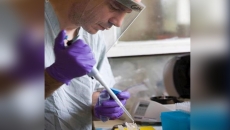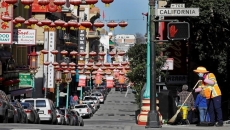BEIJING (AP) — China on Friday attacked the theory that the coronavirus pandemic may have originated as a leak from a Chinese laboratory as a politically motivated lie, after the World Health Organization recommended in its strongest terms yet that a deeper probe is needed into whether a lab accident may be to blame.
Foreign Ministry spokesperson Zhao Lijian also rejected accusations that China had not fully cooperated with investigators, saying it welcomed a science-based probe but rejected any political manipulation.
He also reiterated calls for an investigation into “highly suspicious laboratories such as Fort Detrick and the University of North Carolina" in the United States where China has suggested, without evidence, that the U.S. was developing the coronavirus as a bioweapon.
“The lab leak theory is totally a lie concocted by anti-China forces for political purposes, which has nothing to do with science," Zhao said at a daily briefing.
“We always supported and participated in science-based global virus tracing, but we firmly opposed any forms of political manipulation," he said, repeating China's long-standing explanation for delaying or rejecting further investigations into the virus's origins.
Zhao said China has made major contributions toward virus tracing, sharing the most data and research results.
That “fully reflects China’s open, transparent and responsible attitude, as well as its support for the work of the WHO and the advisory group," he said.
The WHO's stance in a report released Thursday is a sharp reversal of the U.N. health agency’s initial assessment of the pandemic’s origins. It comes after many critics accused WHO of being too quick to dismiss or underplay a lab-leak theory that put Chinese officials on the defensive.
Following a tightly controlled visit to China last year, the WHO concluded that it was “extremely unlikely” the coronavirus might have spread to humans from a lab in the city of Wuhan. Many scientists suspect the coronavirus jumped from bats to people, possibly via another animal.
However, in the Thursday report, WHO’s expert group said “key pieces of data” to explain how the pandemic began were still missing. The scientists said the group would “remain open to any and all scientific evidence that becomes available in the future to allow for comprehensive testing of all reasonable hypotheses.”
Identifying a disease’s source in animals typically takes years. It took more than a decade for scientists to pinpoint the species of bats that were the natural reservoir for SARS, a relative of COVID-19.
The expert group also noted that since lab accidents in the past have triggered some outbreaks, the theory could not be discounted. They said China has not presented any studies to WHO that assessed the possibility of the coronavirus resulting from a laboratory leak.
The new report is indicative of a more confrontational relationship between China's authoritarian Communist leadership and the WHO, which had initially been accused of being overly deferential to Beijing, particularly by the former U.S. Trump administration.
The coronavirus has killed more than 6.3 million people worldwide, forced dozens of countries into lockdown and upended the world economy. It was first detected in the central Chinese city of Wuhan in late 2019 and was initially linked to a traditional market where wild animals were sold for food.
China was accused of responding slowly and covering up the extent of the outbreak, before it locked down the entire city of Wuhan and surrounding areas in the first of a series of draconian measures labeled “zero-COVID” which continue today as much of the rest of the world is opening up again.
Last month, the WHO called “zero-COVID” unsustainable, pointing to increased knowledge of the virus and the cost to the economy and civil rights. China rejected the criticism as “irresponsible."
China was also accused of leading a disinformation campaign, suggesting the virus was detected elsewhere before the Wuhan outbreak and putting forward other theories aimed at diverting attention from China.
Investigations by The Associated Press found that some top WHO insiders were frustrated by China during the initial outbreak even as WHO heaped praise on Chinese President Xi Jinping. They were also upset over how China sought to clamp down on research into the origins of COVID-19.
Zhao appeared to imply that China would reject any criticisms or suspicions of it.
“Research on the origin of the virus must adhere to scientific principles and should not be subject to political interference," Zhao said.





